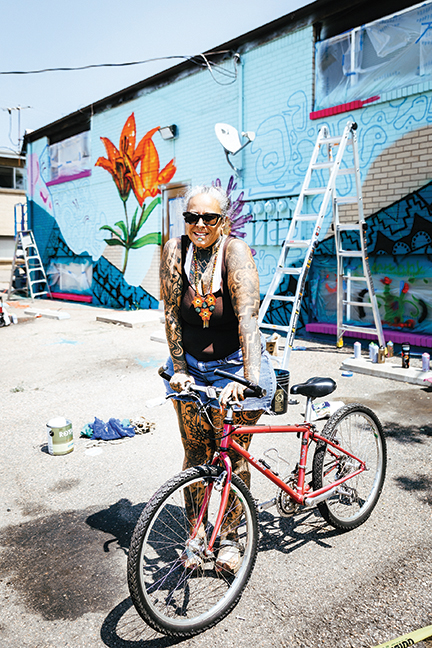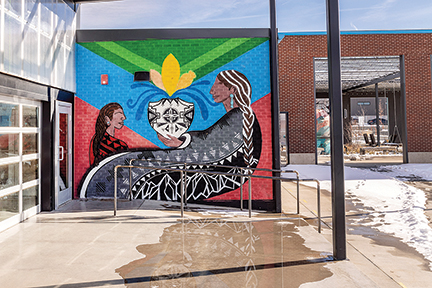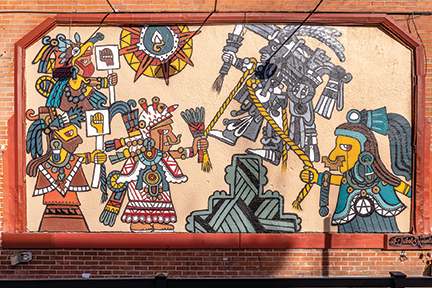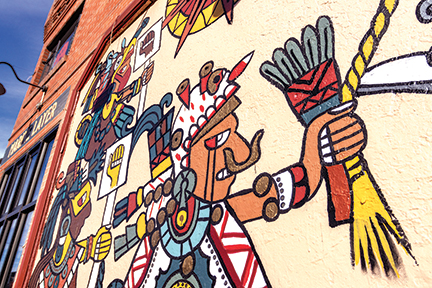
“She came home with her first tattoo at age 15–illegal for her age! I told her, ‘No more tattoos, young lady!’ Her response was to come home with another one. I learned to keep my mouth closed after that!” Alicia Cardenas’ father, Al Cardenas, reflects on the tenacity, passion and dynamic personality that his daughter possessed, even in
her teens.
Alicia Cardenas was killed among beloved peers during the shooting rampage on Dec. 27.
A North Denver native, she was born at 34th Avenue and Eliot Street. Her mom later passed away when Alicia was an adolescent. When asked if Alicia gleaned her creativity from her artist father, Al responded that he never trained her, but she was around art. “Really, she was more like her mother; following her own path in a determined and sometimes stubborn manner.”
Alicia hung out at off-the-beaten path establishments as a teen. St. Mark’s Coffee House in Capitol Hill was a frequented establishment, which back in the early ‘90s attracted an alternative crowd where she piqued her interest in body adornment.
She graduated high school with the clear goal of owning her own tattoo shop. She cleaned houses and delivered pizzas to make it happen. She worked hard. Eventually hired as the manager of a tattoo shop, Alicia proved herself proficient in keeping books and making sure everything ran smoothly.
Her friend Paul Tamburello remembers her as an incredibly smart, savvy and intelligent business woman and wonderful mother. Working hard seemed to be the common denominator for Alicia, as her influence grew far and wide through Denver and beyond. Her father asserts that she never sat still, “She took chances and tried new things all the time. She wanted to experience everything.”

“She was always an advocate for the marginalized,” her father adds, “but not for any kind of attention, just because she wanted to help.”
In the late 1990s Alicia became known for cultivating inclusive and accepting spaces with her first tattoo shop, Twisted Sol, in Capitol Hill. She helped to break barriers for all, where women worked as lead tattoo artists at a time when shops were dominated by men and motorcycle culture. “Alicia was tough but accommodating,” says muralist and Babe Walls member, Grow Love. “We had a revolving mother-daughter relationship, taking turns apprenticing each other.” Alicia took Grow Love on as a tattoo apprentice at her shop and Grow Love, in turn, helped Alicia elevate her mural-painting skills. Alicia progressed to eventually take part in Babe Walls and RiNo Crush Walls mural painting events.

Known for her connection and love towards indigenous culture, Alicia embraced her Mexican-American roots, naming herself a Chicanismo and constantly seeking knowledge of worldwide indigenous peoples. Her tattoos and murals were a platform for her Chicanismo values, incorporating detailed images of indigenous icons and expressing needs for social change.
Her father told a story where Alicia, one day, found the health department sorting through her dumpster with a claim of inappropriately disposed needles. Alicia invited the inspectors into her shop, offered them gloves and demonstrated the meticulous methods she used to sanitize and dispose of needles properly. These requirements were not specific for the tattoo industry at that time, butAlicia became a pioneer in moving them along to keep everyone safe. “It was very important to her that the industry be respected in this way,” her father added. She eventually served on the National Safety Council and the board of directors for the Association of Professional Piercers.
Perhaps it was her passion and openness to all types of cultures that inspired Alicia to be a good neighbor, a community organizer and an overall compassionate person. According to her father, she fed people experiencing homelessness in her neighborhood regularly. During the Black Lives Matter protests, Alicia provided first aid to those who were injured. “She was always an advocate for the marginalized,” her father adds, “but not for any kind of attention, just because she wanted to help.”

“I considered her the ‘Royalty of Murals,’” says Grow Love, “When I first saw her at a mural event her appearance made my jaw drop, I just had to know her! She was a rare person who put her passions into action.” During the many conversations about Alicia recently, most who knew her well mention the word family. “Her tattoo shop on Broadway, Sol Tribe, encompassed a beautiful dynamic of people coming in and out all day,” continued Grow Love. When asked about a tribute mural, Grow Love had already heard of at least three being planned by their peers.
Alicia Cardenas leaves behind a legacy of art, integrity and service. She will be greatly missed in her community.
Several donation efforts have been set up to support Cardenas’ family and Sol Tribe employees:

When looking up this artist as a collector, I am shocked to see that she has been killed. So people, let’s get this straight, there are no excuses or explanations, it’s simply guns and the easy available of them esp. for non hunting purposes. The National Rifle Assoc. and anyone who heralds gun purchase, ownership, etc. are responsible and they have taken advantage of the Hispanic community.